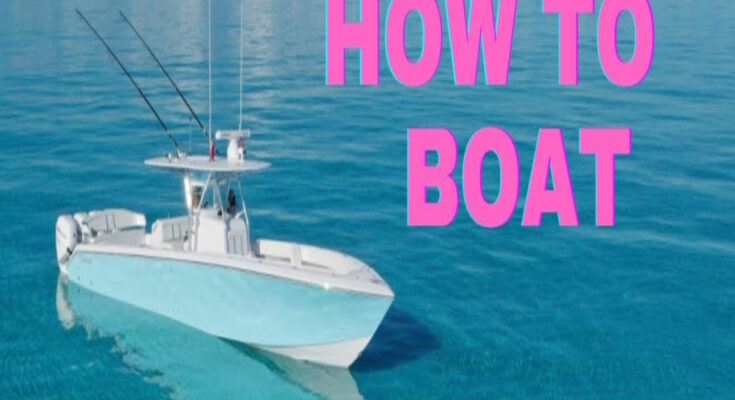Absolutely, here’s a beginner’s guide to boating rules that every boater should know:
1. **Boating Safety Equipment**:
– Always have personal flotation devices (PFDs) or life jackets on board, and ensure they are easily accessible.
– Have a throwable flotation device if required by law.
– Carry a fire extinguisher, distress signals, and a first aid kit.
2. **Boating Licenses and Regulations**:
– Depending on your location and the size of your boat, you may need a boating license or certification. Familiarize yourself with local regulations.
– Understand the rules of the waterway, including speed limits, no-wake zones, and right-of-way rules.
3. **Weather Awareness**:
– Check weather forecasts before heading out.
– Be aware of changing weather conditions while boating. Avoid boating in severe weather conditions like storms.
4. **Safe Boating Practices**:
– Always designate a sober boat operator. Boating under the influence (BUI) is illegal and dangerous.
– Maintain a safe speed, especially in crowded or restricted areas.
– Be mindful of wakes that your boat creates and their impact on other boaters.
5. **Navigation Lights**:
– Use navigation lights between sunset and sunrise and during periods of reduced visibility.
– Learn the meaning of different navigation lights to understand the direction other boats are moving.
6. **Environmental Responsibility**:
– Dispose of trash and waste properly. Keep the waters clean.
– Respect marine life and protected habitats. Avoid disturbing wildlife.
7. **Emergency Preparedness**:
– Have a plan in case of emergencies, including how to call for help and what to do in case of fire, flooding, or grounding.
– Ensure all passengers know where safety equipment is located and how to use it.
8. **Boating Etiquette**:
– Be courteous to other boaters, swimmers, and anglers.
– Keep noise levels down, especially in residential areas or near wildlife habitats.
– Avoid creating unnecessary wakes near docks or shoreline.
9. **Educational Resources**:
– Take a boating safety course to familiarize yourself with regulations, navigation, and emergency procedures.
– Stay updated on boating laws and regulations in your area.
10. **Common Sense and Awareness**:
– Always operate your boat responsibly and with caution.
– Be aware of your surroundings and potential hazards.
Following these guidelines will help ensure a safe and enjoyable boating experience for you, your passengers, and others on the water.
Absolutely! Here’s a condensed beginner’s guide to essential boating rules and practices that every boater should know:
1. **Boating Safety Equipment**:
– Always carry personal flotation devices (PFDs) or life jackets for every passenger on board.
– Have a throwable flotation device if required by law.
– Maintain a fire extinguisher, distress signals, and a first aid kit.
2. **Boating Licenses and Regulations**:
– Obtain any necessary boating licenses or certifications based on your location and boat size.
– Understand local waterway rules, including speed limits, no-wake zones, and right-of-way rules.
3. **Weather Awareness**:
– Check weather forecasts before departing and be aware of changing conditions while on the water.
– Avoid boating in severe weather such as storms or high winds.
4. **Safe Boating Practices**:
– Always designate a sober and experienced boat operator.
– Operate at a safe speed, especially in crowded or restricted areas.
– Be mindful of your boat’s wake and its impact on other vessels.
5. **Navigation Lights**:
– Use proper navigation lights from sunset to sunrise and during periods of reduced visibility.
– Understand the meaning of different navigation lights to interpret the intentions of other boaters.
6. **Environmental Responsibility**:
– Dispose of trash and waste properly to keep waterways clean.
– Respect marine life and protected habitats by avoiding disturbance.
7. **Emergency Preparedness**:
– Have an emergency plan in place, including procedures for fire, flooding, or grounding.
– Ensure all passengers know where safety equipment is located and how to use it.
8. **Boating Etiquette**:
– Show courtesy to fellow boaters, swimmers, and anglers by maintaining a safe distance and reducing noise.
– Minimize wakes near docks, shorelines, and wildlife habitats.
9. **Educational Resources**:
– Consider taking a boating safety course to learn regulations, navigation skills, and emergency procedures.
– Stay updated on boating laws and regulations specific to your boating area.
10. **Common Sense and Awareness**:
– Exercise caution and good judgment at all times while operating your boat.
– Stay aware of your surroundings and potential hazards to prevent accidents.
By following these guidelines, new boaters can ensure a safe and enjoyable experience on the water while respecting the environment and other water users.



